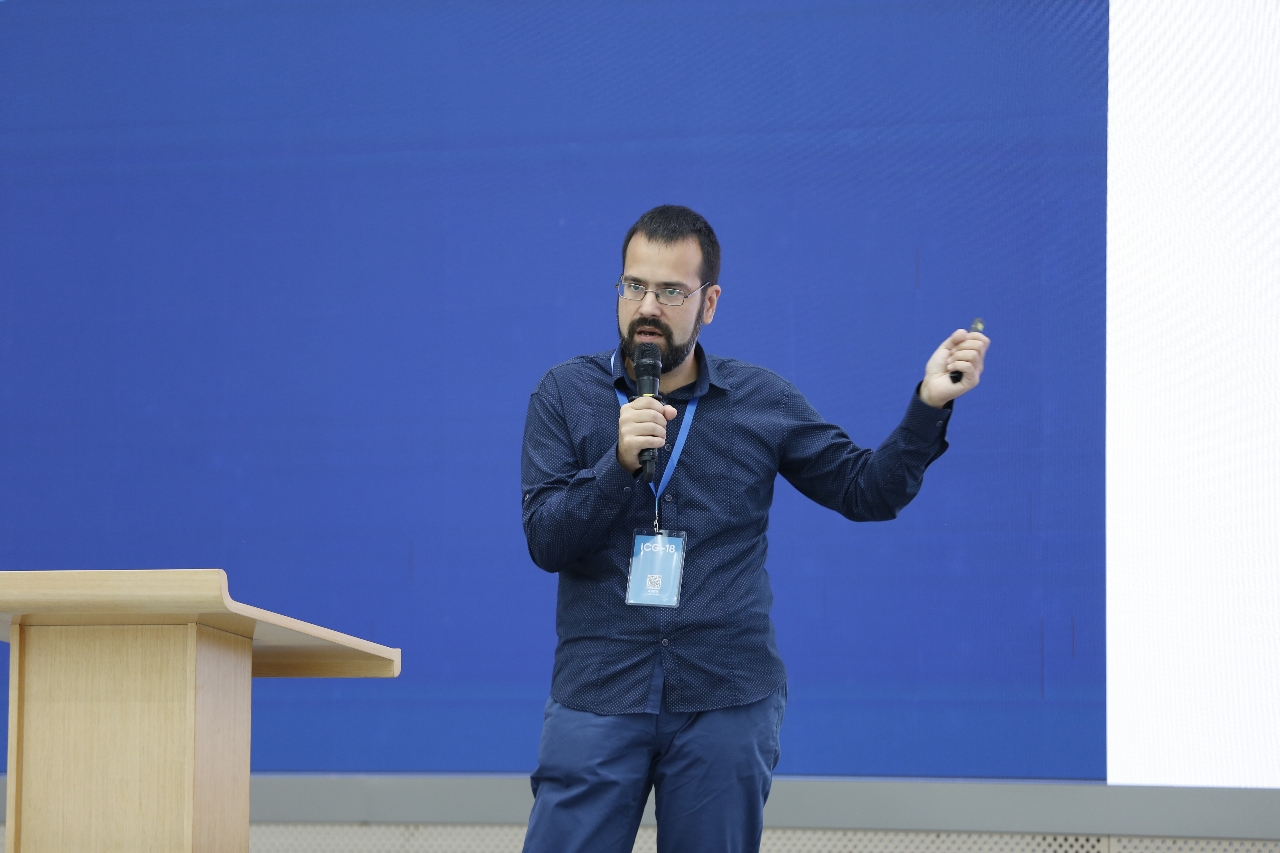“Making the impossible possible.”
This is what left the greatest impression on Dr. Marko Misic, Assistant Professor at the University of Belgrade's School of Electrical Engineering. He was a guest speaker at the recently concluded first BGI International Summer Workshop and the Youth Symposium of the 18th International Conference on Genomics (ICG-18).
Centered around the theme 'AI for Life Sciences,' the event brought together 17 international students, postdoctoral candidates, and young academicians from nine nations, offering the latest updates on BGI Group's cutting-edge work in genomics and biotechnology, as well as an opportunity to interact with over 200 students from various colleges in China.
Today, we have the privilege of speaking with Dr. Misic, who will share his recent collaboration with BGI, his impressions of the event, and his insights into the importance of diverse perspectives in bioinformatics and scientific communication.
 Dr. Marko Misic presented a speech at the symposium.
Dr. Marko Misic presented a speech at the symposium.
Q: Could you please introduce yourself?
I am Marko Misic, an assistant professor at the University of Belgrade, School of Electrical Engineering. I earned my PhD in Computer Engineering and Informatics in 2017, and I teach several computing courses at my school.
Additionally, I have distinctive research fields, including interests in parallel programming and high-performance computing, as well as computing methods in bioinformatics, complex network analysis, and graph theory.
Q: What is your impression of this event and BGI?
I'm really pleased to be here at this event. I recently began collaborating with BGI, so I already had some knowledge about the company. But it's a bit different when you visit the facility and talk to different people.
In Shenzhen, I can see how big the company is, how diverse its portfolio is, and the different businesses it operates. And now, I can clearly see how devoted this company is to research, the advancement of knowledge, and contributing to mankind. That's such a noble mission and vision.
Q: What has been the most memorable aspect of the event, and why?
Two things left a great impression on me. The first one was the two lectures given by the founder (Wang Jian, Co-founder and Chairman of the Board of Directors of BGI Group), and the CEO (Yin Ye, Chief Executive Officer and Executive Director of BGI Group).
In those lectures, I could see the overall strategy and mission of the company. I can say there's a thirst for knowledge because BGI is really passionate about its work. As they say, “Making the impossible possible,” and they also share this with others.
The second impression was the people I met. There were a lot of people from BGI and other places who were very knowledgeable and skilled, with a wealth of new topics to discuss, new solutions, and, of course, new problems. I had a really good impression of all of them. Moreover, there are many resources here, much more than in other countries around the world.
I hope that BGI will continue to connect with other parts of the world. I could see here that BGI is very friendly to developing countries, which is excellent because knowledge should be spread all over the world.
Q: Have the activities at BGI sparked any new interests or intriguing research directions for you?
We have already conducted some research in the field of spatial transcriptomics. Now, my interests are even broader because I've learned about many new aspects of this technology. I've also seen the technology, which is equally important, and there are some new topics in AI for bioinformatics that are also interesting to me. So, I believe that after this event, I will have even more research opportunities and new ideas to share with my PhD students when I return home to Belgrade.
Q: How do you feel about interacting with students from different countries and regions? What kind of abilities do you believe the BGI program can impart to students?
The conference enriches our knowledge. I'm very glad that we have a diverse group here, representing not only different country backgrounds but also various scientific and educational backgrounds. There are people from life sciences, computer science, and those more oriented toward modeling.
So, I believe it's a great mixture that allows us to showcase different perspectives because this workshop can spark multidisciplinary and interdisciplinary discussions. These are crucial for cooperation since bioinformatics is a field that needs diverse perspectives.
Q: What kind of exchange activities would you like to see BGI organize to promote further communication and collaboration?
I noticed that BGI College offers various opportunities, including internships, exchanges, visits, and other events. I would suggest continuing to give people the opportunity to meet in person. Events like these are highly valuable. Both short-term exchanges, 3 to 6 months, and long-term internships, a year or two, can ignite research interest.
Additionally, there is another valuable avenue, perhaps not in person, but in written form. GigaScience, which I believe should be promoted more, could benefit from special issues or dedicated journal activities to spread scientific knowledge.
From my perspective, while top journals like Cell, Nature, and Science are essential, there should also be diverse platforms where we can publish our research results.



